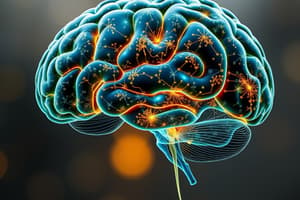Podcast
Questions and Answers
Which of the following describes biological processes in development?
Which of the following describes biological processes in development?
- Changes in thoughts and intelligence.
- Changes within the social relationships of an individual.
- Changes in physical nature such as height and weight. (correct)
- Changes related solely to aging.
What is the life-span perspective in the context of development?
What is the life-span perspective in the context of development?
- Development is solely affected by genetic factors.
- Development only concerns cognitive and emotional changes.
- Development is a fixed process that occurs only during childhood.
- Development is a lifelong, multidimensional process involving growth and decline. (correct)
How do cognitive processes affect development?
How do cognitive processes affect development?
- By determining genetic predispositions.
- By solely influencing emotional responses.
- By altering thought patterns and language abilities. (correct)
- By changing health-related factors.
What is a key characteristic of socioemotional processes?
What is a key characteristic of socioemotional processes?
What is meant by the upper boundary of the human life span?
What is meant by the upper boundary of the human life span?
What does the term 'plastic' refer to in the life-span perspective of development?
What does the term 'plastic' refer to in the life-span perspective of development?
Which of the following factors constructs individual development according to the life-span perspective?
Which of the following factors constructs individual development according to the life-span perspective?
Which statement reflects a misconception regarding developmental change?
Which statement reflects a misconception regarding developmental change?
What does the life-span perspective suggest about development?
What does the life-span perspective suggest about development?
Which of the following statements accurately describes the multidimensional aspect of development?
Which of the following statements accurately describes the multidimensional aspect of development?
What does plasticity in development refer to?
What does plasticity in development refer to?
How do cognitive and socioemotional processes relate to each other?
How do cognitive and socioemotional processes relate to each other?
What do the emerging fields of developmental cognitive and social neuroscience primarily study?
What do the emerging fields of developmental cognitive and social neuroscience primarily study?
What does it mean that development is multidirectional?
What does it mean that development is multidirectional?
Which statement describes the relationship between touching a baby and emotional response?
Which statement describes the relationship between touching a baby and emotional response?
What does the concept of life expectancy refer to?
What does the concept of life expectancy refer to?
What is the primary goal of the Thousand Genomes Project?
What is the primary goal of the Thousand Genomes Project?
In mitosis, what is produced as a result of the cell division?
In mitosis, what is produced as a result of the cell division?
Which process involves the fusion of an egg and a sperm?
Which process involves the fusion of an egg and a sperm?
What defines a zygote in the context of reproduction?
What defines a zygote in the context of reproduction?
What outcome results when a single zygote splits during development?
What outcome results when a single zygote splits during development?
Which statement correctly describes meiosis?
Which statement correctly describes meiosis?
How do identical twins develop?
How do identical twins develop?
Which stage occurs directly before fertilization in the reproductive process?
Which stage occurs directly before fertilization in the reproductive process?
What is the primary focus of psychoanalytic theories in development?
What is the primary focus of psychoanalytic theories in development?
Which step is NOT part of the scientific method as described?
Which step is NOT part of the scientific method as described?
What developmental task do individuals face during early adulthood according to Erikson?
What developmental task do individuals face during early adulthood according to Erikson?
What is the primary focus of behavioral and social cognitive theories regarding development?
What is the primary focus of behavioral and social cognitive theories regarding development?
What results from a life review in the stage of integrity versus despair?
What results from a life review in the stage of integrity versus despair?
How does Skinner's operant conditioning theory explain behavior modification?
How does Skinner's operant conditioning theory explain behavior modification?
What does generativity in middle adulthood primarily concern?
What does generativity in middle adulthood primarily concern?
Which statement best describes the eclectic theoretical orientation?
Which statement best describes the eclectic theoretical orientation?
Which of the following is a characteristic of behavior development according to the provided information?
Which of the following is a characteristic of behavior development according to the provided information?
What role does natural selection play in evolutionary psychology?
What role does natural selection play in evolutionary psychology?
What is an essential aspect of the developmental task in adolescence according to the provided theories?
What is an essential aspect of the developmental task in adolescence according to the provided theories?
What does the inability to help the next generation represent in Erikson's theory of development?
What does the inability to help the next generation represent in Erikson's theory of development?
Which of the following statements is true regarding chromosomes?
Which of the following statements is true regarding chromosomes?
What is the primary argument of behaviorism in developmental psychology?
What is the primary argument of behaviorism in developmental psychology?
In the context of adaptive behavior, what is a key component of the evolutionary perspective?
In the context of adaptive behavior, what is a key component of the evolutionary perspective?
What aspect of knowledge acquisition do the behavioral and social cognitive theories emphasize?
What aspect of knowledge acquisition do the behavioral and social cognitive theories emphasize?
Flashcards are hidden until you start studying
Study Notes
The Nature of Development
- Development is a lifelong pattern of change that begins at conception, including both growth and decline due to aging.
- Life-span perspective emphasizes that development is continuous, multidimensional, and influenced by biological, sociocultural, and individual factors.
- Upper boundary of human life span is 122 years, based on historical documentation.
- Life expectancy indicates the average number of years a person born in a particular year can expect to live.
Components of Life-Span Perspective
- Development is lifelong; no specific age period dominates.
- Development is multidimensional, with physical, cognitive, emotional, and relational changes affecting each other.
- Development is multidirectional; some dimensions may expand while others shrink throughout life.
- Development is plastic, allowing for changes and adaptability in response to experiences.
Biological, Cognitive, and Socioemotional Processes
- Biological processes involve changes in physical nature, including genetic inheritance, motor skills development, and hormonal changes.
- Cognitive processes relate to changes in thought, intelligence, and language.
- Socioemotional processes include changes in relationships, emotions, and personality development.
Emerging Fields
- Developmental cognitive neuroscience connects cognitive processes with brain development.
- Developmental social neuroscience links socioemotional processes and development with brain activity.
Genetic Foundations
- Mitosis is cellular reproduction creating two identical cells, while meiosis forms gametes (eggs and sperm).
- Fertilization occurs when an egg and sperm combine to form a zygote, which is the foundational single cell in development.
- Identical twins arise from a single zygote that splits, creating genetically identical individuals.
Theories of Development
- The scientific method involves conceptualizing a problem, collecting data, drawing conclusions, and revising theories.
- Theories explain behavior and facilitate predictions; they can be interrelated and coherent.
- Hypotheses are testable predictions that inform research.
Psychoanalytic and Behavioral Theories
- Psychoanalytic theories view development as largely unconscious and influenced by emotion, emphasizing early parent-child interactions.
- Behaviorism focuses on observable behavior, asserting that development results from reinforcement and punishment.
- Skinner's operant conditioning demonstrates how behavior's consequences influence its future occurrence.
Eclectic Theoretical Orientation
- This approach synthesizes various theories, selecting the most effective components from multiple perspectives for understanding development.
Evolutionary Perspective
- Natural selection is the process by which individuals better adapted to their environment survive and reproduce.
- Evolutionary psychology focuses on adaptation and survival traits shaping human behavior.
Genetic Foundations of Development
- Chromosomes contain genetic material, organized in 23 pairs received from both parents, serving as the basis for genetic inheritance and diversity.
Studying That Suits You
Use AI to generate personalized quizzes and flashcards to suit your learning preferences.




